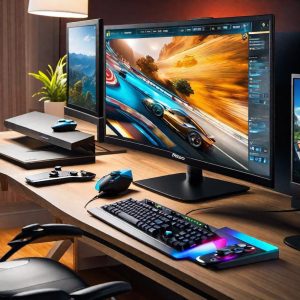
Choosing a processor for your computer can seem like a daunting task, especially if you’re not very familiar with the technical specifications.
But don’t worry, in this article we’ll go over the main points to consider and help you choose the best option for different types of users – gamers, programmers, and those who use their computers for everyday tasks. What is a processor and why is it important? The processor, or central processing unit (CPU), is the “brain” of the computer.
It performs all the calculations and commands you give it.
The more powerful the CPU, the faster and smoother the computer will run.
It seems to make sense.
In addition, you can also read our articles about the history of processors and their evolution to dive deeper into this topic.
And now we’re going to give you tips on how to make the best choice. Tips for gamers If you’re a gamer, choosing a processor is important, as many modern games require high performance.
Here’s what you should pay attention to: The number of cores and threads. Most modern games are well optimized for multi-core processors.
The ideal choice is a processor with 6-8 cores and 12-16 threads.
This will give you smooth performance even in resource-hungry games. Clock frequency. This refers to the processor speed.
Gamers should pay attention to processors with a high base clock speed (3.5 GHz and higher). Acceleration. If you want to squeeze even more out of your processor, choose models that support overclocking.
This way you can raise the clock speed above the standard values and get even better performance.
Tips for programmers For programmers, it’s important that the processor provides fast code compilation and multitasking, especially if you’re working with heavy development environments or virtual machines. Number of cores and threads. If you work with large projects or use several development environments at the same time, then pay attention to processors with 6 or more cores and 12 or more threads. Cache memory. The larger the cache size, the better the processor can work with a large amount of data, for example, this will be very positive for fast code compilation. Energy efficiency. If you work on your laptop frequently or are concerned about power consumption, choose low TDP (thermal package) processors, which strike the right balance between power and energy efficiency.
Tips for ordinary users If your computer tasks are not power-hungry and you mainly use your PC for web surfing, document work, or just watching videos, then you don’t need to buy the most powerful processor.
Here’s what you should pay attention to: Dual-core processors. A dual-core processor with 4 threads is enough for everyday tasks. Energy efficiency. It is also important that the computer runs quietly and does not overheat, so choose processors with low power consumption (for example, 35-65 W TDP). Price. For a budget PC, look for mid-range processors that offer good performance at a reasonable price.
If you’ve already decided what you need a processor for, but don’t know which specific models to choose, here are some simple recommendations, again, for different types of users, as mentioned above.For gamers – maximum gaming performance Are you a fan of games and want your computer to easily handle all the latest titles with high graphics settings?
Here are a few options: Intel Core i5-13600Kis a great choice.
With 14 cores and a high clock speed, you will definitely experience excellent performance.
Moreover, it supports overclocking if you want to get even more power. AMD Ryzen 5 7600X is also an equally powerful processor that is suitable for gaming.
With 6 cores and 12 threads, it’s smooth even in demanding titles. For programmers – a balance between productivity and multitasking If you are a programmer and work with heavy projects or often run several programs at the same time, then pay attention to the following processors: AMD Ryzen 9 5900X – 12 cores and 24 threads make it a great choice for programmers who work with virtual machines, large projects, and complex algorithms. The Intel Core i9-12900K is a very powerful processor, suitable for professional programmers working with large databases or developing artificial intelligence programs.
It combines extremely high performance and efficiency. For ordinary users – affordability and reliability You don’t need a super-powerful processor here if your computer tasks are limited to web surfing or simple video viewing.
We offer the following options: Intel Core i3-12100 – a quad-core processor that guarantees fast and stable system performance for everyday tasks.
It is ideal for working with documents, watching videos, and surfing the web. Intel Core i5-12400 is a good choice for those looking for balanced performance at an affordable price.
Like the previous “i3-12100”, it provides good performance with office applications, Internet surfing, and video viewing without delays. AMD Ryzen 5 4600G – this one with integrated Vega graphics is suitable for users who do not need a separate graphics adapter.
It copes well with everyday tasks and even allows you to play some simple games.
As you can see, each user group has its own best options.
Choose the one that best suits your needs, and don’t forget to consider the possibilities for future updates to keep your computer up to date for years to come.

